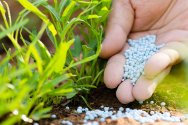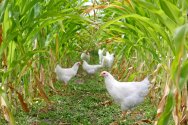
Dossier
Manure
Worldwide, animal husbandry produces large amounts of manure. This is rich in minerals (phosphates, nitrogen, potassium), but also in organic compounds. Manure can be used as a fertiliser or energy source, or to make new products, including bio-based ones. However, it is not always used optimally and therefore can have an adverse impact on the environment.
Wageningen University & Research (WUR) studies how minerals from animal manure, waste streams and artificial fertiliser can be optimised, both within the Netherlands and abroad. Reducing the effects on the (living) environment is key. Moreover, WUR analyses the policies and legislation with regards to manure.
In this dossier, you will find some of the most important findings, developments and information. You can always contact one of our experts if you have any questions.
Reducing the environmental impact of manure
The Dutch livestock farming sector produces a lot of manure. Manure is often seen as a problem. If manure is not processed correctly, it can cause problems: leaching of phosphate and nitrate to ground and surface water. This leads to eutrophication and emissions of ammonia and nitrogen oxides, causing soil acidification and reduction of biodiversity. Many parties work hard to reduce the livestock sector’s effect on the environment and cut back emissions.
To reduce the effects of the high manure production, farmers are required to apply the manure according to prescribed methods such as slurry injector. These methods also leave room for improvement, for example diluting the slurry with water. The main goal of methods such as these is to reduce emission to the environment and increase nutrient uptake by the crop. To achieve optimal efficiency, methods such as robotics and precision fertilisation are increasingly used. But the animals’ intelligence is also deployed, for example, in the pig stye with a toilet that WUR developed in collaboration with the business sector and pig farmers.
Utilising manure as a valuable nutrient
Manure is a valuable resource that provides crops with nutrients. Sometimes, manure is not yet used optimally so that the nutrients it contains are not made available to the crops. This can be remedied through improved conditions, such as a correct pH level in the soil and better drainage. It is important to avoid wasting nutrients. This may also be done through more efficient methods of fertilising and improved business management.
There is a limit to the amount of nutrients crops and the soil can absorb. In these cases, manure must be processed with alternative methods to retain the nutrients. Manure may be fermented or made into artificial fertiliser. Thus, the valuable components can be extracted from the manure, while the manure surplus is reduced. WUR also explores alternative uses for manure, such as breeding insects that can subsequently be used in animal feed.
Better use and processing of manure will contribute to fewer emissions and leaching, lower costs and reduced demand for fossil resources.
Read more about manure legislation (nitrate directive)
Advisory body
Recent publications
-
Consumer acceptance of mycelium as protein source
-
Data underlying the publication: The effect of sulfadiazine in manure on accumulation of sulfonamide resistance genes in freshly consumable plants
-
Perspectief van plasmatechnologie als methaan- en ammoniakemissie reducerende maatregel in de melkveehouderij
- Unfortunately, your cookie settings do not allow videos to be displayed. - check your settings







